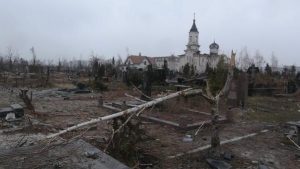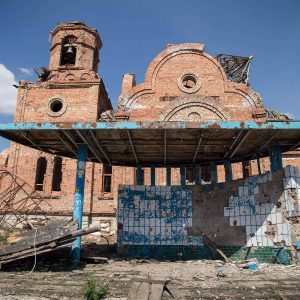However much some in Russia, the West, or even in Ukraine may hope that the Donbas will become “a frozen conflict,” that is not going to happen, according to Russian military journalist Arkady Babchenko. Instead, the facts on the ground point to it becoming a Chechnya of 1998 unless and until Ukrainian forces restore order there.

In an interview with Apostrophe’s Artem Dekhtyarenko posted online today, Babchenko says that there is no basis for thinking that any accords will transform the situation into “a frozen conflict” with “some kind of quasi-state like a second Transdniestria.”
That is “because the Donbas is a territory which is controlled by separate armed groups,” a situation that recalls Chechnya and other parts of the North Caucasus at the end of the 1990s. And as was the case then, “there will be war, banditism and kidnappings” in the Donbas for the foreseeable future.

“There are no other variants in this region,” Babchenkok says. That horrific situation will end only when Ukraine uses its military to restore Kyiv’s control over the region. No political resolution is possible, the military analyst argues, and consequently, “the only way out is via the use of force.”
It is of course possible that a larger war could return, he continues, but he suggests that this is not “a highly probable scenario.” “As long as Vladimir Vladimirovich Putin is in power in Russia, the Russian Federation will always be involved in a war. Only the theater of military operations will change,” just as it has now shifted from Ukraine to Syria.

“But if Syria will not fulfill those domestic political tasks which [the Kremlin] has placed on it, then the theater of military action could shift back to the Donbas.” Those tasks are two:
- Distracting attention from Putin’s failures, from thinking that "the tsar is bad,"
- And providing Russians with a new enemy to blame for their own economic and societal problems.
At the same time, Babchenko says, were Putin to be replaced just now, that “would mean the complete loss in Russia of state power and control,” a development that would leave the Donbas in a state of anarchy. His departure would mean that Moscow would have no control there and require Kyiv to intervene to restore order.

For the time being, he adds, “Putin doesn’t need a major war on the territory of Ukraine,” and without Moscow’s support, those anti-Ukrainian elements in the Donbas are not capable of launching one. Consequently, the war there will continue at a low level of intensity with various people proclaiming falsely an armistice again and again.
Those fighting against Ukraine in the Donbas “do not have any final goal and cannot have one,” Babchenko explains. “These are people with arms who live in the here and now while pursuing, as their only goals, killing ‘Banderites’ and engaging in marauder actions.” They don’t have any bigger goals than that.
And those who think that Russia doesn’t have the resources to support this kind of conflict are deluding themselves. Moscow has sufficient military equipment left over from Soviet times to continue such a conflict in eastern Ukraine “over the course of decades,” an unpleasant reality but a reality nonetheless, Babchenko concludes.





